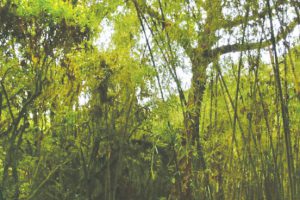
Restoring and creating fertile land is a matter of survival for all lives and it is one of humanity’s most precious assets. In a record breaking last year Ethiopia launched a historic tree planting campaign across the country. Last year, over four billion trees were planted in an ambitious move to counter the effects of deforestation and climate change.
As deforestation has ramped up, Earth’s climate has changed significantly. Warmer, more adverse climate conditions are creating more difficult growing conditions for forest ecosystems. So as to overcome the problems happening on earth planting trees is among the solutions to protect the ecosystem.
This year as well the country has planned to plant over 5 billion seedlings and with the next four years to pant 20 billion trees across the country. The representative of different organizations, diplomats, ambassadors, Ethiopian peoples from child to old age was participating in the campaign.
This year while launching the second round tree planting initiative nationally FDRE Prime Minister Dr. Abiy Ahmed said that “Over the past few months, the world has been challenged by the COVID-19 pandemic. As a global community, we have been exerting energy and putting significant resources into mitigating the spread of the virus.
One thing that this period has made us aware of is human vulnerability, the importance of maintaining personal health and creating an environment that supports wellbeing. Our natural environment is an important determinant of human health. And a healthy ecosystem which supports biodiversity is critical.
Like other parts of the world, Ethiopia has also been confronted with climate change and environmental degradation. Such effects have contributed to flooding, soil erosion, deforestation and biodiversity loss.
Therefore, countering climate change and paving the way for green growth has been one of our key development objectives. Through the 2020 Green Legacy program, Ethiopia has set an ambitious target to plant 5 billion seedlings in this rainy season.
This target is part of our larger goal of planting 20 billion trees during a four-year period. The Green Legacy initiative we launched last year resulted in the planting of over 4 billion seedlings nationally. More than 20 million people were mobilized throughout the country in our first ever mass planting engagement.
On a historic July day, Ethiopia also planted close to 354 million seedlings in a 12-hour period. Thousands of people young and old went out to plant their print on our national green legacy day.
Beyond the number of seedlings planted, an additional triumph for us is the survival rate. Of all the trees planted in last year’s Green Legacy challenge, 84 percent have survived. Through the implementation of follow up measures, we have been able to maximize the survival rate, which is nature’s encouragement to forge ahead.
Our Green Legacy initiative is critical to Ethiopia’s aspirations to build a green and climate resilient economy. Broad-based in our approach, our greening efforts look at both rural and urban greening.
Over the past several months, national planning efforts have been underway in preparation for this year’s planting season. Various nurseries throughout the country have been preparing the required number of seedlings. Federal and Regional Government entities have also been organizing ahead of time, to proceed as intended.
The only thing that makes this year different is the pandemic we are confronted with as a global community. Nevertheless, while our resilience will be tested, we are committed to meeting our set target and planting in a COVID responsive way.
So, as the world commemorates World Environmental Day, I call upon the global community to stand in solidarity with Ethiopia as we embark on this year’s Green Legacy season.
The initiative aims to tackle the effects of deforestation and climate change in the country. The United Nations estimates that Ethiopia’s forest coverage has declined drastically to a low of just four percent in the 2000s from 35 percent a century earlier.
Expert in the sector believed that even though the primary aim of planting is to mitigate climate change to make it successful it is important to tie it with the economic benefit that it will bring. Expert with Environment, Forest and Climate Change Commission Meseret Abdisa told The Ethiopian Herald that the legacy has multidimensional benefit apart from mitigating air pollution and reducing carbon emission to the air. Reforestation is an important tool for reducing biodiversity loss and mitigating climate change and also transform degraded land to fertile one.
Planting a billion hectares of trees won’t be easy. It would require a massive undertaking. If each and every individual plant trees in their respective areas they will create clean and attractive environment and it could reduce the severity of global climate change by planting hundreds of billions of trees to remove excess carbon from our atmosphere, he indicated.
Planting by itself is not enough. The planted sapling needs continuous care until they grow up. Trees require a different amount of care from the day they are planted. Accordingly, they require people in order to water and prune those trees. This creates jobs for citizens living both in urban and rural areas and also for others.
Dr. Adefris Worku said that the country has long history of planting tree campaigns. With this long history of planting trees still the country has not fully benefited from the sector. Importing wood products is increasing and lots of challenges are hindering the sector growth.
Among these misconceptions, policy related constraints, poverty related problems, and others. For a long period of time and still, today agriculture is the backbone of the Ethiopian economy sharing high GDP and there are misconceptions in increasing productivity of the sector. He indicated that, many of the Ethiopian farmers see widening agricultural engagement via clearing forest land as the only means of increasing productivity.
This will have multidimensional problems on the economy of the country. Ethiopia is importing wood related products for domestic consumption costing billions of dollars annually. The government is exerting its effort and playing an exemplary role by launching different initiatives to overcome the problems but much effort remained, says Adefris.
The Ethiopian herald June 13,2020
BY HAILE DEMEKE




